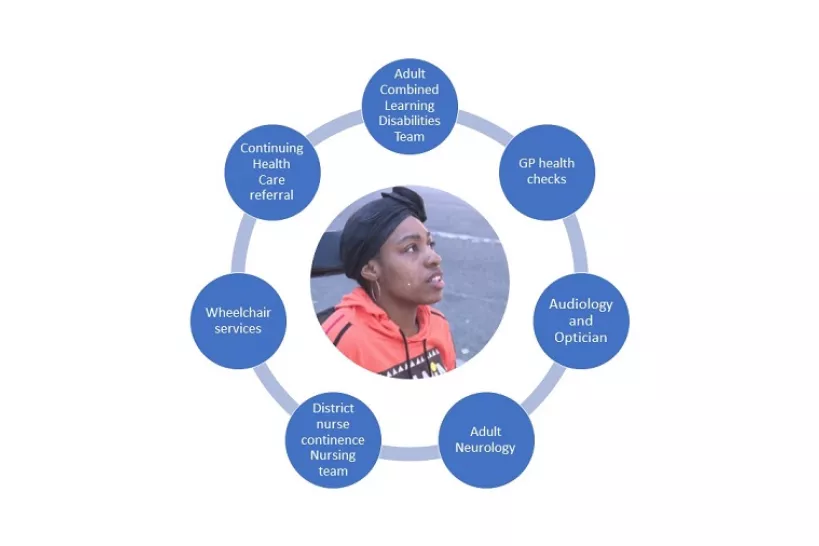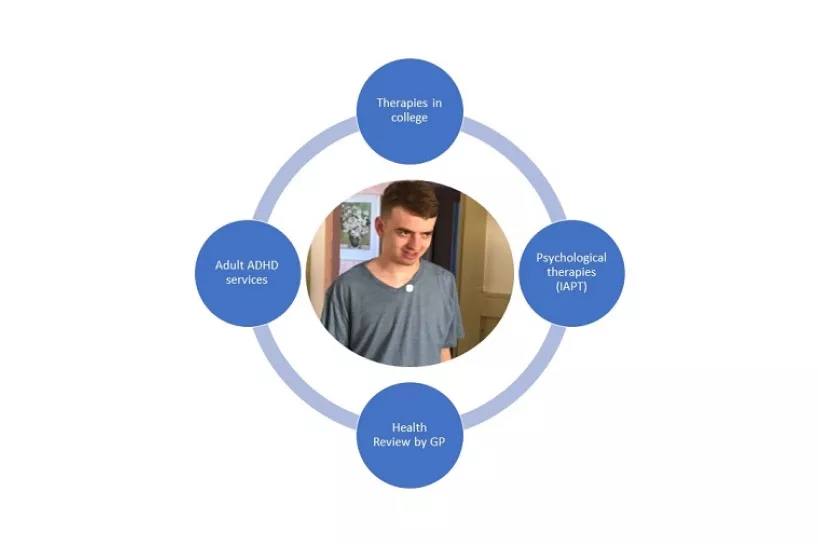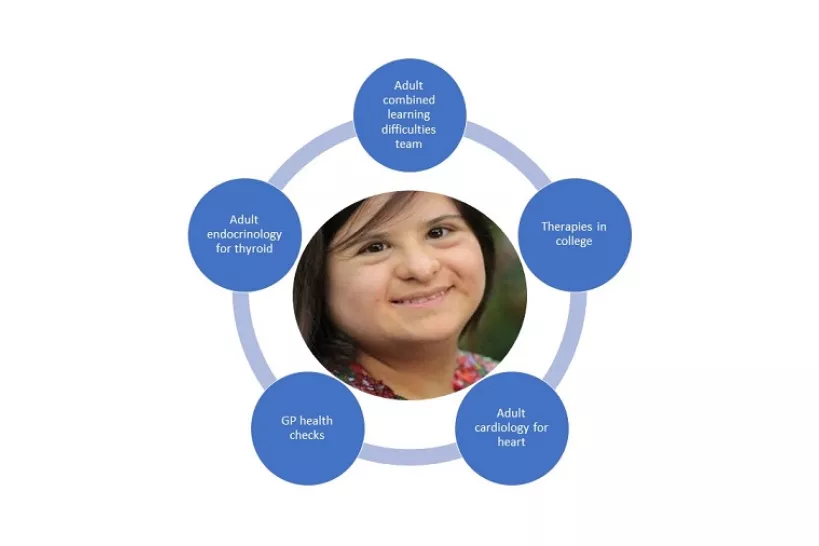Transition to adult health services
Last updated: 2 December 2024
Next review: 2 December 2025
Services change for young people at 18 years old. Services such as Child and Adolescent Mental Health Services or physiotherapy may refer you to specialist services in adulthood. You may be referred back to your GP for more advice on managing your condition.
You can find out more about how individual services will support young people through the transition to adult health services on the general health services page.
Transition to adulthood presentation video
By watching the video you can find out more about transition to adult services, and how health services are accessed for people with Special Educational Needs and Disabilities.
What happens to health services on transition to adulthood presentation video (Transcript) (Word File)
case study
The examples below are to show three young peoples transition arrangements in their 18th year
Cecily
Cecily is 17.5 years old, she has 4 limb cerebral palsy and epilepsy. Cecily has an Education Health and Care plan. She attends a Special School. She has profound learning disabilities and some visual and hearing impairment. Cecily is fed via a tube into her stomach called a gastrostomy, and is on medications. She has specialist seating and a wheelchair. Cecily is considered to have a learning disability. At her appointment with the Consultant Paediatrician the following referrals are agreed:
The Consultant Paediatrician will refer to the Adult Neurology Team for monitoring of Cecily’s physical needs. Referrals are also made by a Physiotherapist, Occupational Therapist and Speech and Language Therapist to the Adult Combined Learning Disability Team.
Cecily is under another hospital for monitoring of her back issues related to her cerebral palsy.
Cecily’s GP will continue to monitor her medications, and complete a yearly review of her overall health.
The Consultant Paediatrician sends a copy of her report to the Special Educational Needs Social Care Team children’s.
Cecily is not able to say what she wants to do in adulthood, however her family and carers report that she likes going outside in her wheelchair, music and swimming. Cecily has respite and some home care from the SEND team. Cecily's family complete a social care screening tool which is sent to the SEND social work team. The SEND Social Worker completes a community social care plan to allow Cecily to do these activities in adulthood.
The School Nurse and Social Worker will refer to Adults Continuing Health Care and complete the Continuing Health Care Decision Support Tool to see if Cecily will be eligible for health funding in adulthood. The school nurse also refers Cecily to the district nursing team as she has an area of skin on her heel that might become a pressure sore.
Cecily
This image shows the services Cecily will be referred to in adulthood

Omar
Omar is 17 years old and has Autism and Attention Deficit Disorder (ADD). He attends a mainstream school and has an Education Health and Care plan. Omar passed GCSE’s including maths and English. He is considered to have a learning difficulty. Omar has Speech and Language Therapy as part of his Education Health and Care plan. He has a programme from Occupational Therapy and has been discharged, but can contact the service again if he wants a review.
Omar wants to go to college to do IT as he loves computers, and he also loves riding his bike. He still has some difficulties with his organisational skills and fasteners on clothing. Omar is known to Child and Adolescent Mental Health Services (CAMHS) for monitoring of his ADD medication. He can be anxious, particularly about changes in his routine, so is finding transition stressful.
Omar is reviewed by CAMHS and referred to the adult Attention Deficit Disorder services for monitoring of his ADHD medications. His GP is informed. During his CAMHS appointment he talks about his anxiety and says he is ok as long as he can do things he enjoys, such as riding his bike in the park. Omar is referred to his GP for management of his physical health and to have a health check carried out. He is given information about accessing mental health services for some short-term interventions about his anxiety. He decides to contact Occupational Therapy for a one off review before he starts college.
Omar's college apply for additional funding so that they can provide a communication and self regulation programme from their own speech and language therapist as part of his college curriculum.
Omar
This image shows the services Omar will be referred to in adulthood and is described in the previous text

Bethany
Bethany is 17.5 years old and has Down Syndrome and has an Education Health and Care plan. She attends a special school. She enjoys typing and drawing and carpentry. She regularly makes signs from wood and ink at home for friends to hang on their bedroom doors. She would like to make this into a business when she leaves education, and wants to go onto college. Bethany is considered to have a learning disability.
Bethany has heart and thyroid difficulties. She is under orthotics as she has insoles to support her foot arches and prevent knee pain. Bethany communicates verbally and uses some symbols in a communication book to help herself be understood by an unfamiliar people.
Bethany has a last Consultant Paediatrician review. She is referred back to her GP for medication management. She is under Cardiology at Great Ormond Street Hospital who refer her to an adult cardiologist at 18 years. She is referred to an adult endocrinologist for monitoring and management of her thyroid condition. Bethany has yearly health checks with her GP.
Bethany’s Speech and Language Therapist updates her communication book with her before she leaves school to go to college. Bethany is referred to the adult combined learning disabilities team for management of her orthotics. Her college apply for additional funding so that they can provide a communication programme from their own speech and language therapist as part of her college curriculum.
Bethany
This image shows the services Bethany is referred to and is described in the above text

Transition support tool
Transition from children to adult services can be complex and confusing due to the different ways adult health services are arranged from children's services.
To help you with some of your questions, the health services have designed a Transition Support Tool to guide you through the process. You can use this tool by answering 'yes' or no' to the questions as they appear.
This tool is for you to use and no one will see your answers - you can do this more than once